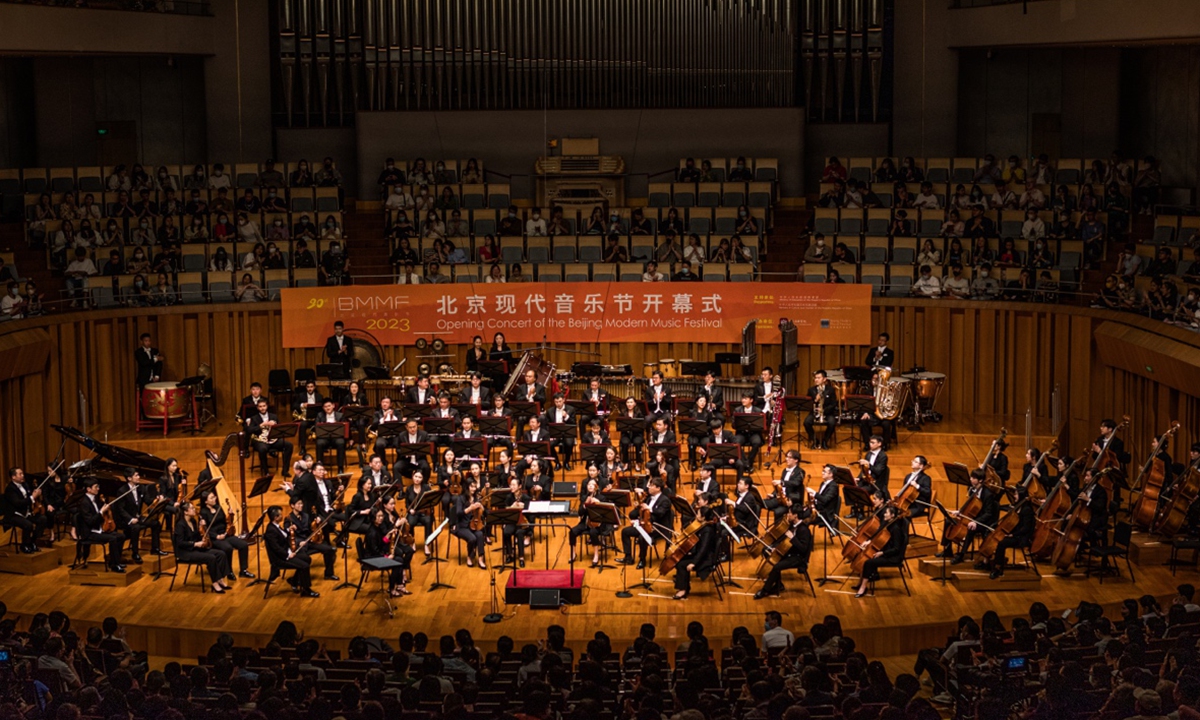ARTS / CULTURE & LEISURE
Beijing Modern Music Festival returns after three-year hiatus
Platform to convey Chinese cultural spirit: expert

Photo: Courtesy of Beijing Modern Music Festival
The Beijing Modern Music Festival kicked off in the Chinese capital on Monday.Focused on the continuous exploration of combining tradition and modernity, the festival, set to run until Friday, is an international arts and cultural platform featuring "performances, education and exchanges." Since it was launched in 2002, the festival has become a signature cultural event in Beijing and a renowned activity to promote modern Chinese music to the world.
"I was extremely excited when I announced the opening of the Beijing Modern Music Festival yesterday. Due to COVID-19, the festival was suspended from 2020 to 2022. So this festival marks its comeback after China's pandemic control policy changed," Ye Xiaogang, art director of the festival, told the Global Times.
"This musical festival has been well received. This shows that people's lives have returned to normal after the pandemic, but also the enhancement of their aesthetic tastes and cultural confidence," he said.
The five-day festival will consist of three "masters classes in composition," nine concerts and one musical culture development forum.
Qin Wenchen, a vice president of China's Central Conservatory of Music, Robert Morris, a composer and music theorist from the US, and Chad Cannon, a young composer also from the US, will give three classes each to share with Chinese students their experience in learning music composition and creation.
Participants in the festival include many distinguished orchestras, namely, China's Symphony Orchestra of the Central Conservatory of Music, the Symphony Orchestra of National Ballet of China, Beijing National Traditional Orchestra and the School of Music of the Chinese University of Hong Kong,Shenzhen. Quite a number of famous conductors such as Chinese conductors Yu Feng, Zhang Guoyong and Wu Huaishi, and notable pianists such as Huang Ruoyu, Edoardo Turbil and Michael Tsalka are also taking part in the festival.
In addition, Chinese musicians will also play traditional Chinese instruments such as pipa (a four-stringed plucked instrument), erhu (a two-stringed bowed instrument), guzheng (a 21-or- 25-stringed plucked instrument), and suona (a woodwind instrument). More than 100 Chinese singers will perform and over 40 composers from China, the US, France, Germany, Austria, Estonia as well as other countries and regions will bring dozens of new musical works to the festival.
The nine concerts include the Qin Wenchen concerto concert on Monday, a Chinese folk music concert on Tuesday, a Chinese folk and orchestral music concert, a Chinese folk and chamber music concert on Wednesday. Thursday will see a concert from The School of Music of the Chinese University of Hong Kong,Shenzhen and a symphonic works concert, while Friday brings the World Dulcimer Family Concert and the closing concert.
As the dulcimer is a part of Chinese culture, the Dulimer Music and Cultural Development Forum will be held on Friday. Approaching the instrument from the perspectives of China and the world, the forum will hold discussions on the status quo and future development trend of dulcimer music.
Modern Chinese music has seen diverse and all-round development, said Ye, also president of the China Music Association and School of Music, professor at the Central Conservatory of Music, and president of the Chinese University of Hong Kong,Shenzhen.
"The Beijing Modern Music Festival is a platform for academic and artistic integration and exchanges, a stage to present youthful musical works, and a means to convey the spirit of modern Chinese music," he said.
As the founder of the festival, Ye has devoted himself to promoting new modern Chinese music to the world for 20 years, a mission that he has been able to carry out thanks to strong support from China's Ministry of Education, Ministry of Culture and Tourism and the Central Academy of Conservatory. More than 400 concerts and nearly 100 lectures and master classes have been held at the festival, and a great number of books, scores and audio and video products have been published at the event.
Ye said he hopes that "many young dreamers will go to the world stage for academic exchanges in music and that modern Chinese music will be introduced to the world so that everyone can listen to its voice."

